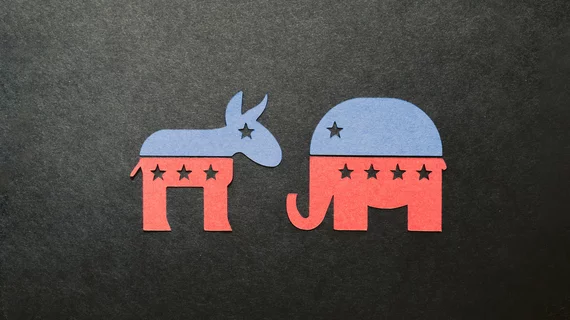Is regulating AI one pursuit that can unite a polarized Congress? 5 reasons to hope so
Skeptics may be forgiven for doubting the spirit of togetherness will have any staying power, but for now America’s two major political parties are talking in practical unison about working things out over a common cause.
The partisan-busting issue isn’t military aid for Ukraine. Contention over that matter is growing more heated by the day. No, what has our leaders all but holding hands is the threat of AI doing damage both at home and abroad.
The willingness to join forces has now been expressed atop both chambers of Congress. In late April, Speaker of the House Kevin McCarthy (R-CA) said of the need to oversee AI: “[M]embers on both sides of the aisle can be here. We are all in it together.”
And yesterday, June 21, Senate Majority Leader Chuck Schumer (D-NY) addressed the D.C.-based nonprofit Center for Strategic & International Studies (CSIS). The gist of his half-hour message: Congress must support AI innovation while keeping it from making an afterthought of human safety.
Among Schumer’s points most likely to invite cross-aisle agreement:
1. Hearings on Capitol Hill won’t be enough to keep AI from running roughshod over human rights and democratic governance.
“AI is one issue that must lie outside the typical partisan fights of Congress. The changes AI will bring will not discriminate between left or right or center. It will come for all of us and thus demands attention from all of us.”
2. To stave off exploitation and a repeat of globalization’s evisceration of middle-class U.S. jobs, Americans from many walks of life should be asked to make their voices heard on AI.
“We will need everyone at the table—workers, businesses, educators, researchers. Further, what’s to stop a shady business from using AI to exploit people with addictions, financial problems or serious mental illnesses? How do we make sure AI isn’t used to exploit workers or encourage racial bias in hiring?”
3. Reminder: AI itself takes no position on core American values like liberty, civil rights and justice.
“If we don’t set the norms for AI’s proper uses, others will. The Chinese Communist Party, which has little regard for the norms of democratic governance, could leap ahead of us and set the rules of the game for AI. Democracy could enter an era of steep decline.”
4. AI that doesn’t explain its reasoning deserves universal distrust of its outputs.
“Congress should make this a top priority. If an AI system can’t give some explanation of why it chose one answer over other possibilities, we may not be able to [count on it for] accountability, security and protection of our democratic foundations. Explainability is, thus, perhaps the greatest challenge we face with AI.”
5. Coming this fall: a Congressional convening of the ‘top minds in AI’ to help lay down a new foundation for AI policy.
“We need the best of the best sitting at the table—the top AI developers, executives, scientists, advocates, community leaders, workers, national security experts—all together in one room, doing years of work in a matter of months. Opposing views will be welcome, even encouraged, because this issue is so new that all ideas must get a chance to be at the table.”
In addition, Schumer said he’s established a bipartisan group of senators to take the lead on “deepening the spirit of bipartisanship around overseeing AI innovation and safety.” The co-leaders of this effort are Martin Heinrich (D-NM), Todd Young (R-IN), Mike Rounds (R-SD) and Schumer himself.
The CSIS has posted a video and transcript of the talk and the brief Q&A session that followed.

